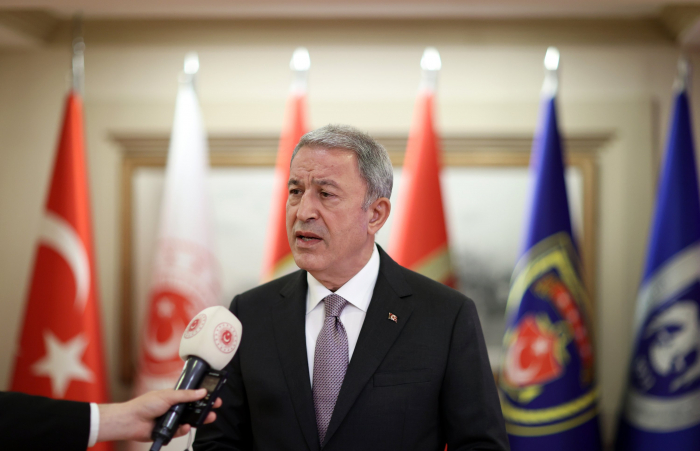A coordination center for exporting Ukrainian grain is expected to be set up in Turkey's largest city Istanbul, Defense Minister Hulusi Akar said shortly after Turkey hosted a four-way meeting on Wednesday.
"An agreement has been reached on the establishment of a coordination center with representatives of all sides, joint controls for checking grains at harbors, and ensuring the safety of the vessels in the transit routes, following the meeting which took place in a positive and constructive atmosphere," Akar said.
He noted that Turkey, Russia and Ukraine would meet again next week and sign an agreement.
Praising the meeting as an important step toward solving the global food crisis, Akar said the four sides have discussed all details related to the grain corridor.
"We see that all sides are eager to solve this problem," he said, adding that Turkey will continue to undertake the responsibility to contribute to regional and global peace and prevent humanitarian catastrophes.
Meanwhile, United Nations Secretary-General Antonio Guterres hailed the agreement on Ukrainian grain exports, saying it is an "important and substantive step" to ease global hunger.
He also said the four-way meeting in Turkey has demonstrated that Ukraine and Russia can talk, but there’s still a long way to go for peace.
"Next week, hopefully, we'll be able to have a final agreement. But, as I said, we still need a lot of goodwill and commitments by all parties," he told reporters in New York.
The high-stakes meeting involving U.N., Russian, Ukrainian and Turkish officials in Istanbul broke up after slightly more than three hours without the participants speaking to the press. The summit in Istanbul, which started at around 4 p.m. local time, marks the Russian and Ukrainian governments’ first face-to-face talks since another meeting in the Turkish metropolis in late March.
But a U.N. spokesperson said Guterres would soon brief reporters about the "positive" movement at the talks.
"We believe that this is something positive and (Guterres) will talk to you at some length about why that is," U.N. spokesperson Farhan Haq told reporters in New York.
The stakes could not be higher for tens of millions of people facing the threat of starvation in Africa and other poor nations because of the battles engulfing one of the world's main grain-producing regions.
Ukraine is a vital exporter of wheat and grains such as barley and maize. It has also supplied nearly half of all the sunflower oil traded on global markets.
But shipments across the Black Sea have been blocked by Russian warships and mines Kyiv has laid to avert a feared amphibious assault.
Turkey has been working with the United Nations to broker a deal after Russia’s Feb. 24 invasion of Ukraine fuelled prices for grains, cooking oils, fuel and fertilizer.
The war has trapped about 22 million tons of grain inside Ukraine, according to Ukrainian President Volodymyr Zelenskyy.
U.N., Turkish and other officials are scrambling for a solution that would empty the silos in time for the upcoming harvest in Ukraine, which is at risk amid a shortage of storage space due to the halt in exports.
The U.N. Food and Agriculture Organization (FAO) says the war is endangering food supplies for many developing nations and could worsen hunger for up to 181 million people.
Some grain is being transported through Europe by rail, road and river, but the amount is small compared with sea routes.
More about:
















































